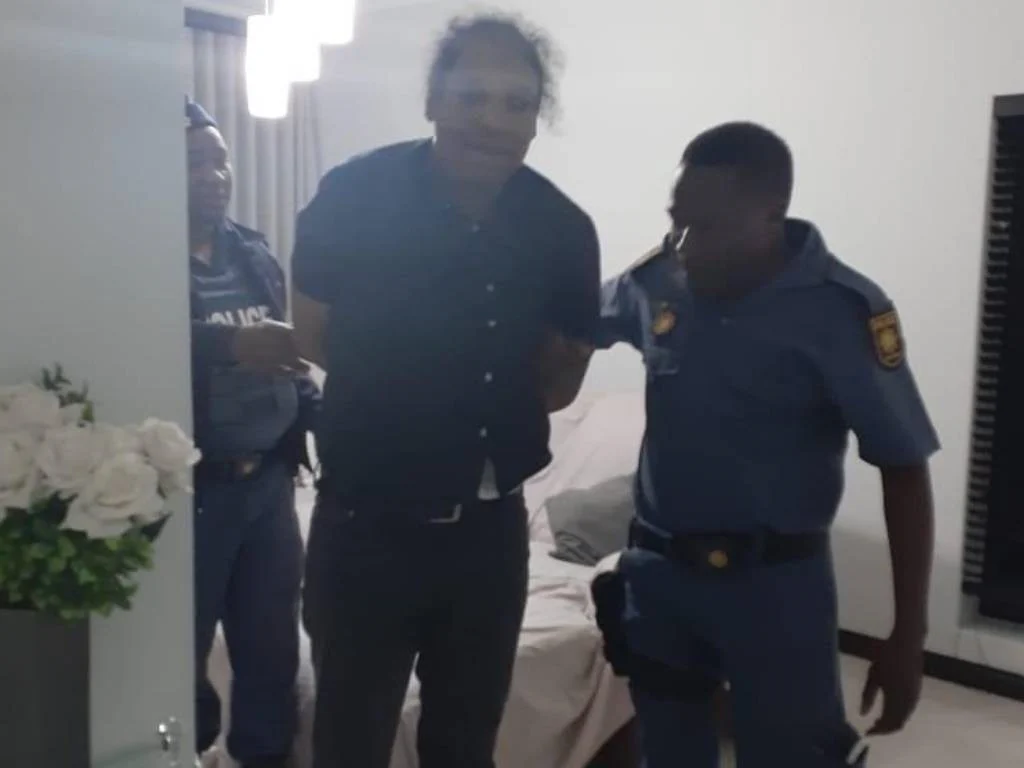The alleged kingpin Esmael Malude Ramos Nangy being arrested Photo Twitter @Abramjee
South Africa – On Sunday a multidisciplinary team, led by members of the Trilateral Planning Cell (TPC) and Interpol, arrested an alleged kingpin living in an upmarket estate in Centurion. The alleged kingpin, identified by SAPS as Esmael Malude Ramos Nangy, is a fifty-year-old man wanted in Mozambique on a number of kidnapping cases where ransom demands were made.
Nangy, who is a transport businessman and has permanent residence in South Africa, appeared in the Tembisa magistrate’s court on Monday. His matter has been postponed to January 16 to allow the state to seek instruction from the director of public prosecutions and finalise the extradition process with Mozambican counterparts.
According to Chad Thomas, CEO at IRS Forensic Investigations, the kidnappings that took place in Mozambique share a similar modus operandi to the ones in South Africa.
“When the kidnapping for ransom started in the past couple of years we always knew there was a link back to Mozambique. We knew that it was a syndicated crime. We knew that the modus operandi was very similar to that used in Mozambique and we saw these crimes being committed from Mafikeng through to Mbombela. Eventually they spread to places like Laudium, Lenasia, Fordsburg and then it became a free-for-all. What we identified at that time was that the kidnapping syndicates were linked to other syndicates in other countries.”
The kidnapping for ransom was so well publicised in South Africa that syndicates were franchising it to local syndicates or there were a lot of copycats, said Thomas. The copycats were far more amateur in their ways which saw a lot of their members being arrested.
The alleged kingpin, kidnappings and his arrest
Nangy is a Mozambican national who was identified as a “transnational kidnap for ransom kingpin” as far back as 2018. A kingpin is someone who sits at the top tier of leadership, does all the planning and benefits the most, explained Thomas. Being identified as a transnational kingpin indicates Nangy is involved in cross border kidnappings and involve other jurisdictions.
“From the perspective of where he stands in the structures, he stands at the very top. I think the reason they’ve named him is to show the foot soldiers if we could get this man that you thought was untouchable for the last five years, well then we are coming for you.”
National SAPS spokesperson, Brigadier Athlenda Mathe, confirmed the arrest warrant and an extradition request was received in July last year from the Mozambican government. The arrest warrant was issued by Mozambique via Interpol. It was after this was received that SAPS intelligence components started actively looking for Nangy. Due to the arrest warrant being issued by Mozambique, it is very likely that he will be extradited there first, said Thomas.
“The warrant of arrest originated in Mozambique. He will have to be extradited to Mozambique. It means that the majority of the cases against him are Mozambique related cases. However, should they find that there are cases in South Africa directly linked to him, there may be an opportunity for the South African authorities to want to try him locally prior to him being extradited. Whether that happens or not we don’t know. It’s an order in which the authorities together with the International Community of law enforcement have to discuss. He may be extradited to Mozambique, stand trial there, serve his sentence there, be extradited back to South Africa and stand trial here for any crimes that may have been committed on South African soil.”
SMread: Back to school, back to the budget board
Kidnapping in South Africa
Kidnappings in the country either happen due to syndicates or what Thomas calls “copycats”. Thomas warned that just because kidnappings are not being reported in the media, does not mean it has stopped completely.
“What’s happened in South Africa is we had people that copied the modus operandi. We call them copycats. Then there were syndicates that were linked to the main syndicate that franchise out. They use the same modus operandi and they would pay a fee for being able to use that modus operandi. With the copycats we’ve seen a lot of kidnapped for ransom of normal, average South Africans. We’ve seen in informal settlements kidnappings occur where they ask for R2 000 and R5 000 … Kidnapping hasn’t stopped and this isn’t going to stop kidnapping.”
According to Thomas, a lot of kidnapping cases go unreported because the family cooperate or the police are involved but because it isn’t a high profile case, it doesn’t make it to the media. Kidnap for ransom has proven to be a “very viable tool in the tool case of organised crime”. As such, even with this arrest, it is imperative people do not let their guard down, said Thomas.
SMread: Masks encouraged, but no drastic response to Covid mutation
Sentencing for kidnappers
For kidnapping to stop, harsh sentences need to be imposed on kidnappers. According to Thomas, kidnappers can expect a 15 year sentence when all their chargers are added up. However, it is imperative they do not get granted parole after they serve one-sixth of their sentence.
“They need to have the harshest possible sentencing pose and the way they’re going to be able to do that is to prove that these different kidnapping groups have operated as a criminal enterprise. That then introduces an act known as POCA, the Prevention of Organised Crime Act, which has far more serious sanctions than most common law offenses would have … The minimum I would anticipate a person involved in a kidnapping syndicate in South Africa would be sentenced to, would most probably be in the region of about 15 years if one takes into consideration the other related crimes and that could go up as high as 25 years.”
